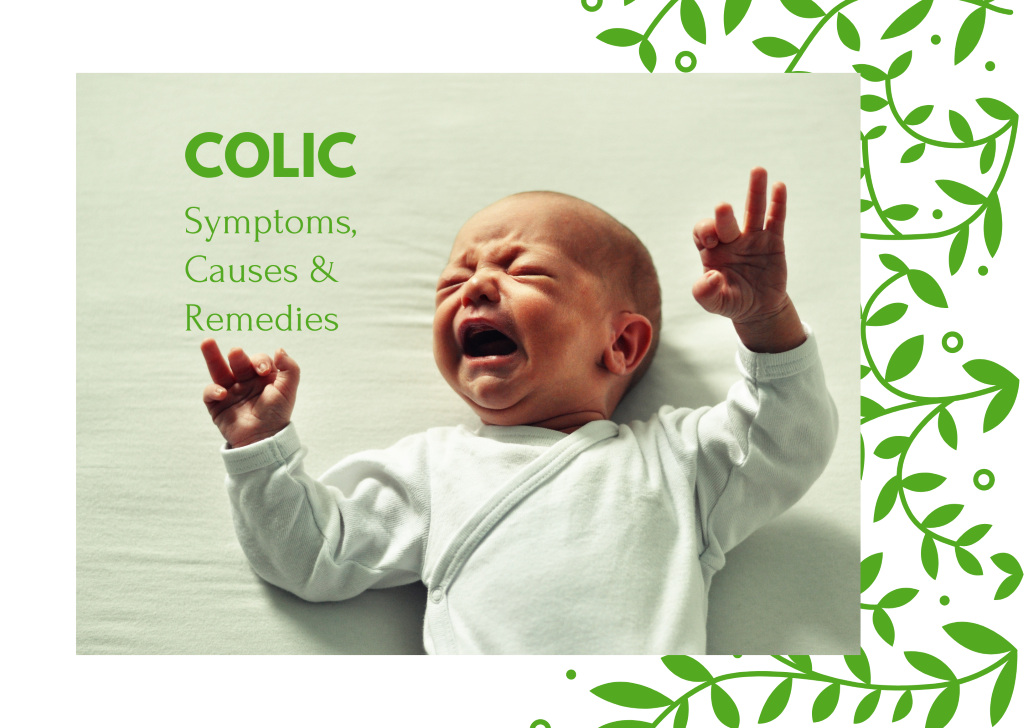It is an elation bringing your newborn to your home of paradise and celebrating the joy of the arrival of new member added to your family is no less that happens in every one’s life. But few weeks after, you wonder about your baby doing more than sleeping, eating, urinating and crying. No matter what you try, you won’t be able to comfort your crying baby – and it does not end there. You repeat these painful night after night at the same time of what seems to be eternal. Might be you are so confused of what’s really going in your baby. Do not worry mamma! Here we try to help you to understand whether your baby enters into the world of colic. Most of the parents would experience colic in babies. Let us explore and understand colic.
What is colic?
Colic is not a disease but it is a frequent, prolonged, intense crying and significant distress in a well-fed, healthy baby. In fact, every baby cries to communicate for their needs at this tender age and as a parent we are programmed to respond to those tiny needs. But babies with colic, crying suddenly starts for no apparent reason and there is no apparent cure too. Colic is a combination of baffling behavior in babies. These fussy times can go on for hours, sometimes can go late into night. It is extremely difficult to calm down a colicky baby and you compound your own frustration, worry and exhaustion.
How to identify the colic in babies?
Generally doctors diagnoses colic in infant based on the baby’s crying putting it into “three” rules as
- Baby cries at least three hours a day.
- Continues atleast for three days in a week.
- Persists for atleast three weeks in a month.
The following are some other signs of colic baby.
- Babies cry for a long hours starting at the same time every day.
- Prolonged crying, ear-shattering wails, complete with clenched fists, flailing legs and an unhappy red face.
- Babies try to close their eyes or open up widely.
- Bowel activity may increase, and babies may pass gas or spits up.
- Eating and sleeping are disrupted by the crying.
- Baby do frantically wishes to breastfeed only to reject it, once sucking has begun, or sucks for few minutes only to wake up screaming.
Causes for colic
There is no reason for the causes of colic effects in babies found yet. But few things that are related may include overstimulation, gas pain, immature nervous or digestive system and stomach spasms.
How to soothe a colicky baby?
Being frustrated and exhausted, you also try in vain to soothe your fussy baby. Though there is no cure for colic but the following tips can be useful to calm your baby. Just give each a shot before trying with the next and also do not pull out too many tricks at one time.
If you suspect overstimulation,
Respond: Crying is the only way a child can express his or her needs. But it is also his only way of wielding any control in spite of the great new and strange nature. In fact, research shows that an immediate response to your baby’s cries will reduce his or her crying over time.
Excitement: Limit visitors and avoid putting your child in a new experience in refreshing environments, especially in the afternoon and evening. Watch how your child responds to certain things and avoid anything that might seem offend.
Create peace: Trying to make your child’s environment more peaceful can help them to relax. Dim the lights and talk or sing in soothing tones with your baby. Keep your baby away from some noise and distraction.
If you suspect gastro intestinal issues,
Apply pressure on the baby’s stomach: Some babies with colicky feel relieved when pressure is given on their stomachs. So place your baby down on your lap or straight on his stomach on your shoulder. Then gently rub or pat on the back as you hold your baby.
Make your baby to burp: If your child’s uncontrollable anxiety is due to gas, sometimes blowing it up will help ease the pain. Make sure you make your baby burp successfully.
Ask for antigas drops: Studies show that reducing gas can reduce discomfort and crying. So ask your paediatrician for antigas drops, which allows your baby feel comfortable. Although research has not yet shown that this type of treatment is definitely helpful with colic but you can try if your doctor suggests.
Consider probiotics: Probiotic drops may reduce the crying in some colicky babies, perhaps because they reduce stomach problems. Probiotic bacteria naturally grow in the digestive tract and help promote intestinal health. Also, research is very limited, but check with your pediatrician to see if you should give it a chance.
Watch what you eat: If you are breastfeeding, talk to your doctor about whether you should try to temporarily eliminate any foods from your diet that could cause stomach problems for your baby, such as cruciferous veggies (cabbage, cauliflower, etc.), nutritious citrus fruits or allergenic foods (milk, soy, wheat , eggs, peanuts, tree nuts, fish).
Ask about changing formulas: For some formula-fed infants, a variety of routine alternatives designed for sensitive or non-cow’s milk can make a difference. Studies have found that giving children with colicky hypoallergenic whey-hydrolyzed formula reduces the symptoms of colic in some children. Just make sure you get your doctor’s permission before making a change. Also, remove casein-hydrolyzed formula or water-free formulas as a treatment for colic – there is no enough evidence that they work.
Other calming remedies for colic baby,
Be close to your baby: Not only cuddling or carrying your baby gives them the pleasure of being safe but it can help you better tune to their needs. Are you worried that holding on your child will make them spoiled or clingy? Put those fears aside. You can’t harm a newborn baby so try holding or cuddling to soothe your baby.
Swaddle: Wrap a blanket tightly around your little one. The combination of warmth and feeling of security can help to dry a child’s tears.
Try white noise: The hum of the vacuum cleaner or dryer can comfort babies (remind them of the womb). A white noise can also help soothe your baby.
Play cool music: A crying baby can also respond to a quiet lullaby song or by playing a little classical music. Some babies enjoy the sounds of nature or a fan sound. Repeating “shh” or “ahh” to your child can also help. Try to find something that your child seems to like.
Get into motion: Try swinging or rocking or move around. Newborn babies feel comfortable as we move, it seems to be in the womb and that makes your baby feel calm.
Give the pacifier: Some children with colicky seem to have food all the time and that may be because breastfeeding is comforting, not because they are hungry. So if your baby seems to be constantly starving frequently and adequate feeding seems unsatisfactory, a pacifier can help. However, seek help from your doctor if you are not sure that the baby is getting enough food.
Move out of the house: Sometimes switching to outside the house can magically change a child’s feelings. Movement can also help to calm them. Take your baby for a walk experiencing a soft and fresh air which makes them to get soothe and comfortable.
Gripe water and colic
As an anecdotes there in the category of little evidence is gripe water. It is touted as a herbal home remedy for everything from baby gas to colic. Some parents do believe somehow gripe water calms down the colicky baby but there is no reliable studies or research has shown its effectiveness in relieving colic symptoms. The quantity of gripe water should be considered important. Always check with your pediatrician before giving your baby gripe water or any other treatment.
The Takeaway
Babies do cry to communicate or express their needs like hungry, diaper change, sleep or any other uncomfortable feeling. But if the babies cry with no reason at the same time every day, then they might be suffering from colic. Ask for your doctor’s advice and can try any of the remedies to soothe your baby. Try not all the remedies at same time rather you can try one by one. Though there is no cure, these remedies help to calm your baby at time. Do not worry mamma! This state will not prolong for days, soon your baby’s uneventful journey changes.
Sources:
- Colic – Symptoms & Causes https://www.mayoclinic.org/diseases-conditions/colic/symptoms-causes/syc-20371074
- Infantile colic https://www.ncbi.nlm.nih.gov/pmc/articles/PMC6091773/
Related article : Safekeeping newborn


Pingback: Safekeeping newborn : A Guide - MOMKNOWZ